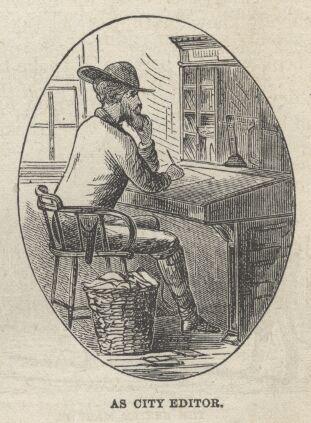"I sat down, in the cabin, and gave myself up to solid misery—so to speak. Now in pleasanter days I had amused myself with writing letters to the chief paper of the Territory, the Virginia Daily Territorial Enterprise, and had always been surprised when they appeared in print. My good opinion of the editors had steadily declined; for it seemed to me that they might have found something better to fill up with than my literature. I had found a letter in the post office as I came home from the hill side, and finally I opened it. Eureka! [I never did know what Eureka meant, but it seems to be as proper a word to heave in as any when no other that sounds pretty offers.] It was a deliberate offer to me of Twenty-Five Dollars a week to come up to Virginia and be city editor of the Enterprise.
I would have challenged the publisher in the “blind lead” days—I wanted to fall down and worship him, now. Twenty-Five Dollars a week—it looked like bloated luxury—a fortune a sinful and lavish waste of money. But my transports cooled when I thought of my inexperience and consequent unfitness for the position—and straightway, on top of this, my long array of failures rose up before me. Yet if I refused this place I must presently become dependent upon somebody for my bread, a thing necessarily distasteful to a man who had never experienced such a humiliation since he was thirteen years old. Not much to be proud of, since it is so common—but then it was all I had to be proud of. So I was scared into being a city editor. I would have declined, otherwise. Necessity is the mother of “taking chances.” I do not doubt that if, at that time, I had been offered a salary to translate the Talmud from the original Hebrew, I would have accepted—albeit with diffidence and some misgivings—and thrown as much variety into it as I could for the money."
"9 January 1906: note for 251.32–38," in Autobiography of Mark Twain, Volume 1. 2010
... when I came to Virginia in 1862 . . . forty dollars a week attached to it] Clemens arrived in Aurora, in the rich Esmeralda mining district claimed by both Nevada Territory and California, in April 1862. There, living hand to mouth, he immediately set about wielding pick and shovel while energetically speculating in mining “feet,” or shares, to the extent his limited funds allowed. That April he also began contributing letters, under the pen name “Josh,” to the Virginia City Territorial Enterprise. Before the end of July, partly on the strength of the “Josh” letters, none of which survive, he was offered the post of local reporter, as a temporary substitute for the paper’s local editor, William Wright (1829–98), best known under his pen name, “Dan De Quille.” By late September 1862, having failed to strike it rich in Aurora, Clemens had relocated to Virginia City and was reporting for the Enterprise. His earliest extant articles appeared in the paper on 1 October 1862 (see ET&S1, 389–91). He remained on the Enterprise staff until he left Virginia City for San Francisco in late May 1864. For his vivid accounts of his experiences in Aurora and Virginia City see his letters of the period (10? Apr 1862 to OC through 28 May 1864 to Cutler, L1, 184–301) and chapters 35–37, 40–49, 51–52, and 54–55 of Roughing It.
Twain's career as a reporter culminated in his trip to the Sandwich Islands. Isaac Gewirtz in his "Mark Twain A Skeptic's Progress" writes:
Twain, during this first phase of his literary career, was decidedly unskeptical regarding the benefits of an American foreign policy that he would, in his later years, bitterly attack: American imperialism. The case in point was the imposing of American democracy on an aboriginal people who would soon be incorporated into the expanding American empire: the Hawaiians. Twain visited Hawaii for the first time in 1866, as a correspondent for the Sacramento Daily Union. Whether because he was complying with his employer’s imperative, which was to influence California public opinion in favor of American control of economic interests in the Islands, or because he believed it himself, Twain took up the American imperialist cause, at first training his fire on Hawaii’s recently appointed Anglican bishop, Thomas Nettleship Staley, who, American officials alleged, was using religion to promote British economic interests. Americans comprised the vast majority of sugar plantation owners (it was Americans who had introduced mass production of the crop into the Islands, displacing the traditional native occupation, whaling), and they, as well as California importers and a large network of related business interests, wanted to ensure not only that Americans would retain economic control of the Islands, but that the American sugar tariff should be reduced so that they could enormously increase their profits. To these ends, they were eager to make the issue a question of patriotism and resistance to foreign control of a native population inculcated by forty years of American missionary work in the principles of democracy and an unestablished Church. Twain, in his Daily Union letters, followed the “company line,” alleging that the Puritan democracy and republicanism thus established were being undermined by Bishop Staley. But Twain’s outrage at the unholy use of religion to further economic interests was duplicitously selective. As he knew, many American missionaries had left the Church and had become the owners of large sugar plantations, and they and their progeny formed a large subset of the American plantation owners.
